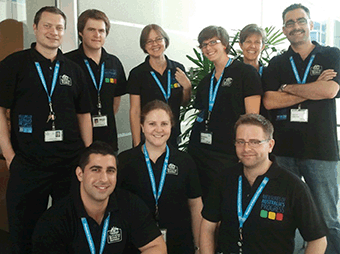THE MAP FORUM
‘One way to achieve a balanced outcome will be to ensure feedback is obtained from a representative group of commentators. That is, ensure a cross-section of types of organisations are included in the consultation (e.g. community, academic, governmental, business), as well as providing opportunities for the general public to comment.’ – Future directions for measuring Australia’s progress (ABS 2010).
The MAP forum was conducted at ABS House in Canberra on 18 November 2011 and brought together diverse participants. It included the ERG members, TAP members and other selected participants who were invited to attend to further broaden the base of knowledge that could be drawn upon.
The forum aimed to further refine the aspirations for national progress by identifying gaps and discussing issues where there was not consensus. The forum took as its starting point material compiled from preceding consultation activities to assist delegates to move efficiently through the very broad ranging issues (the discussion starter material is at Appendix C).Delegates were asked to assess the material in terms of their particular field of expertise, and from a broader, more global perspective. The forum also aimed to facilitate discussion about the relationships between the four MAP domains and to identify gaps and articulate issues that they felt were important to take into account.
Issues raised during the forum
Forum participants expressed appreciation for ABS’s consultative approach, and confidence in the direction MAP was taking. They endorsed the process of first considering what aspects of life Australians think are important for national progress – and then developing measures to address these. It was felt this would allow gaps in statistical measurement to be identified and that this was an important task in itself.
Forum participants emphasised the need for the final aspirations to be expressed in non-bureaucratic, everyday language that would resonate with the Australian community. They hoped the aspirations would be relevant across generations.
- Progress for different groups
Other desirable outcomes of the MAP consultation would be the inclusion (in the refreshed MAP product) of disaggregations of the national indicators, to show how progress varied across different groups of people and regions.The idea of displaying longer time series for some indicators where possible was also discussed.
The value of using subjective well-being data was endorsed, particularly as a complement to objective data and as a way of rounding out understanding of issues such as crime, safety and health.
The group discussed the 2011 MAP dashboard. Some suggested there may be indicators that correlate with progress in more than one domain and therefore would be particularly informative. Others felt that linkages between the domains were complex and best represented by a range of indicators as currently stands.
Several important ideas were identified as recurring across the four MAP domains including: resilience, sustainability, equity, opportunity, connectedness, and efficiency. Other cross-cutting themes identified throughout the consultation included global citizenship, infrastructure and well-being.
- A separate governance domain
The various discussion groups at the forum discussed and strongly endorsed the inclusion of governance as a separate domain within the MAP Framework. They agreed with our representation of governance as an enabler of societal progress (see figure 1.3).
Relationships between the MAP domains
The forum identified relationships between and within the four MAP domains. Some of these were seen as potential tensions, such as the relationship between effective regulation and freedom within the governance domain. Other relationships were identified as supportive alignments; for example, the economic and social domains are aligned in their support of the opportunity to meet basic needs as a means of achieving well-being. Such potential tensions and alignments need to be kept in mind to fully understand the factors that may influence progress outcomes.
The forum highlighted and confirmed that one of MAP’s roles is to present data about these interacting aspects of life in one place, so they can be considered together, rather than separately. In this way, attention is appropriately placed on important tensions, leading to discussion about how they might be reconciled. For instance, if Australians aspire both to a prosperous society and one that sustains natural resources for future generations, MAP will allow broad progress in these areas to be assessed together, informing decision-making in both areas.
During the consultation more broadly, a number of possible relationships and tensions were also identified. Some of these are listed below. This is not a comprehensive list of all such relationships, but provides some examples as a starting point for further discussion.
- Higher wealth can be balanced with environmental sustainability
- Essential social needs, such as time spent with family and in carer responsibilities can be balanced with the necessity of achieving economic well-being (either from an individual or economy-wide point of view)
- Maintaining social cohesion and tolerance can be balanced with increasing cultural diversity
- Access to services for all can be balanced with Australia’s unique geographical characteristics
- Short term decisions can be balanced with long term sustainability
- Accountability and transparency can be balanced with privacy and private sector freedoms
Figure 3.1: ABS Staff at the MAP consultation forum

 Print Page
Print Page
 Print All
Print All